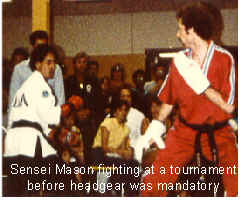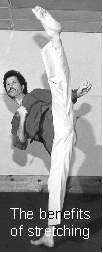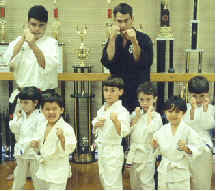Training for Competition and Combat
What is the relationship between training, sparring in the Dojo, free-fighting in competitions and self-defense? Some have argued that tournament competition (specifically, free-fighting) has little if any value in preparing one for survival in the street. Others counter saying that while free-fighting is not the same as actual combat, it is about the only practical way a fighter can test their skills, without actually looking for fights in the street (something less than desirable). What is often missed by both sides is that there is a measure of truth in both of their respective positions.
Sparring in the Dojo can be a very useful training tool. From it one can learn several lessons, including distancing and timing. Without these skill you cannot control the moment of engagement with an opponent. These skills can only develop in a free fighting format when an attack can be launched spontaneously, rather than in a prearranged format like a partner practice routine. Typical self-dense techniques won't give you everything you need here. For example, most self-defense techniques are taught something like... "You're standing here and someone does this" or "You're in this situation, when suddenly..." Normally, you avoid those things which may inflame the situation i.e. you aren't in a fighting stance with your guard up. But what do you do when you've been blindsided? Certainly there's little doubt that this is a fight. No need to worry about escalating a tense cold war into a hot one, it's already past that stage. Self-defense techniques are, for the most part, reactive in nature. That is, they are designed to allow you to react to someone else's action. That is fine, as far as they go. But what if you face more than one opponent? How then, are you going to have the skills to counter your attackers? How are you going to react or respond to their further attacks?
Not everything is handled from a stationary position with a simple block and counter. How you close and cover distance in attack and defense becomes critical here, and it is in precisely this area that free-fighting benefits the martial artist the most.
 |
Free-fighting can be a great confidence builder as it can provide the student with some means of self-defense in a relatively short amount of time. Normally, competency in any system of self-defense requires years of training. Sparring techniques, however, being relatively simple and fewer in number, require much less time to achieve a minimal level of competence. This sort of superficial level of mastery could serve as a stop-gap or temporary method of defense until the student becomes more firmly grounded in their training.
Beyond free fighting in the Dojo, tournament competition gives you the opportunity to face opponents whose techniques and tactics may be unfamiliar and different from those that you have experienced in sparring at the Dojo. This places you in a situation which will, reveal what spontaneous responses and reactions you have developed. It tests your reflexive skills in a way that is analogous to an actual combat situation. A real fight.
For all its benefits, however, free-fighting (especially competitive fighting) is not without its problems. For one thing, many competitors and spectators alike see tournament fighting as the end, the ultimate demonstration of an individual's martial skill. Nothing, however, could be further from the truth. I am not addressing the "spiritual' benefits of martial arts study and training here, but from the standpoint of martial arts study for self-defense, viewing fighting competition as anything other than a means to an end, is at best myopic.
Competitors sometimes look down upon non-competitors because they feel the non-competitor lacks either the skill or the courage to compete. Their argument is that the intensity and stress of fighting competition brings one closer to that of actual combat than any other form of training. Granted, competitive fighting does raise the intensity and stress factors for the fighter, but what in competition does that? First of all, the intensity for many comes from the glory, the desire to win a prize (trophy, money, whatever). Second, and this may be the one that produces the most stress, is the fact that one is also performing in front of his friends, juniors, peers and even betters. Without a doubt this certainly takes courage, but there is a great difference between fighting in a 'controlled' environment, or in front of others for glory, and fighting for one's life. Sparring in the dojo or the tournament ring, for all its benefits and glory, is still only a game of tag. At least that is what it is supposed to be. As such, one's participation and subsequent performance in competition should not be considered the only measure of an individual's skill or courage in a fight.
When it comes to competition, there are those who simply are not motivated to risk a bloody nose, sore ribs or jammed toes for a mere contest, but would willingly risk all, fighting like one possessed, when the safety of their loved ones or themselves is at stake.
Free-fighting, and specifically competition, is neither good nor bad in and of itself. It is only useful when seen and used as one tool among many. You cannot build a house thinking a hammer is the only tool you will need. Neither can you build a house without one. In this respect it becomes clear that learning to spar in the Dojo, followed by venturing out to competition, offers a path of personal development that will hone a students fighting skills. Short of actual combat there really is no way to develop real combat experience and courage. Here, free-fighting, including competitive fighting, can benefit the martial artist for it comes the closest in a relatively safe and controlled environment to simulating actual combat. You are facing a moving target that is trying to score on you, as you try to score on them. For the competitor, what must be avoided is the tendency to view non-competitors as inferior, unskilled or lacking courage. The non-competitor, on the other hand, must come to see sparring, in the Dojo or at a tournament, for what it was intended to be, namely a tool, a means to an end. It offers a way to test your martial arts skills in a controlled format, against skilled opponents who are trying to beat you. Along with your other training, sparring and competition fighting will contribute to your development as a well-rounded complete martial artist.
This article was adapted from an original essay by
R.A. Orlando
Get flexible and stay fit
"In a world where things are changing rapidly, flexibility is a better survival strategy than force."
"There is a formula in karate. Attitude and form equal speed, which in turn equals power. Most people want power in the beginning, forgetting that this is a developmental process. If one has an intelligent attitude and practices form only, one's movements will naturally become more rapid and hence more powerful. But one must stay always with attitude and form."
"Fitness experts say a limber body is a healthy and happy body, and getting that way takes little of your precious time". Stretching is something that we all do everyday, stretch our time, stretch our budgets, stretch our relationships. Somewhere in there, stretch turns into stress when we overload our schedules without giving ourselves 'time out' by taking the time necessary to stay in physical, mental and emotional shape. What helps us to do that is stretching our bodies on a regular basis, since flexibility covers more than just being limber. It is a potent antidote to stress.
Yet flexibility tends to be a missing link in many people's hectic schedules, even those who know that eating right and being physically active are healthy pursuits. However, knowing it is different from actually doing it.. Stretching can release tension and stored bad energy, improving heart rate and relaxation. We have been raised to believe that no pain means no gain, yet stretching can be about feeling comfortable and under control according to Bob Anderson in his book "Stretching". It can be peaceful, relaxing and non-competitive, completely adjustable to the individual. Stretching can help induce a better night's sleep. Tension, but not pain, in the muscle is the target. Hold it for five to twenty seconds, depending on how tight you might be. People who stretch regularly do better emotionally, having better control of their temper and their schedules.
 |
Anderson says that stretching maintains the range of motion that you have today. If you make stretching a regular part of 'your' life and make it comfortable, the more you will do it and the more your body accepts the benefits. Stretching can dramatically improve your athletic performance according to Tim Grover, personal trainer to Michael Jordan. Of course, martial arts is a premier way to become more flexible since every class begins with a stretching regimen that all students are encouraged to fully participate in with their best effort.Excerpted from an article by Bob Condor of the Chicago Tribune |
Support Your School and Sponsor a New Member
The highest honor and greatest respect you can show to the Chief Instructor of a Dojo, is to compliment the school and refer others to the University Karate Center.
Sponsoring a new student is four levels above just referring a student. It means mentoring, bonding, helping and encouraging your friend or family member.
The study of martial arts is about constant and never-ending improvement. The participation of families in martial arts is helpful, because when a family participates in training everyone can help each other and encourage each other through the challenges of practice. Also, when a member of a family experiences drastic self-improvement, it has a positive impact on their family and everyone around them.
Look at supporting your school as a personal opportunity to show appreciation and respect for your Sensei and your school. It certainly gives you an opportunity to introduce your friends and loved ones to the world of martial arts study.
Under the student Qualification Code, martial arts students are expected to refer their school to their friends or family members. It goes hand in hand with the ancient tradition of martial arts and the Student Creed: ‘helping myself and my community’.
It is important that you extend an invitation to your friends and acquaintances to come and visit your Dojo. You should invite them to come and visit your school along with their parents, perhaps to watch a class together, or to get started with an introductory course.
If you need information on class times for new students, brochures, or information on our student VIP Referral Program, please ask at the Front Desk.
Remember it is in the spirit of martial arts to share helpful information with our friends and loved ones.
by Meron Agonafer
 |
Sensei Bergstresser teaches a group of young beginners |
Parent / Sensei Meeting
Several parents have requested the opportunity to meet with the instructors so that the purpose and practical aspects of the martial arts program here at the karate school can be outlined. Mr. Mason has designed the structure of the program so that the extensive information contained in the school curriculum is presented to the children, from the Little Dragons to Young Adults, in a way that promotes their growth and development. Most parents are primarily interested in one of three main areas: the sport aspect, the self-defense aspect and the personal growth aspect, which includes elements of physical, emotional and psychological development.
Actually when properly taught, martial arts can help the individual child develop in all respects, giving them positive values that can last a lifetime.
Sometimes parents are so busy that they do not always get a chance to learn enough about this training to know how their children are benefiting from it. It can take time for a child to master the challenging skills of the extensive curriculum that we teach.
The meeting has been scheduled for Sunday November 12th from 6:00 pm to 7:00 pm. We encourage both parents to attend so that everyone can have a more complete understanding of our program here at the University Karate Center.